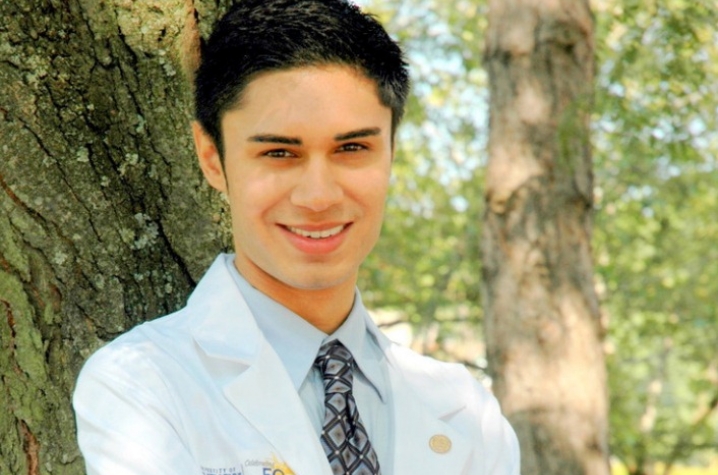Medical Student’s Research First of its Kind

LEXINGTON, Ky. (Dec. 8, 2011) — Krishna Subhash Vyas, a second-year medical student at the University of Kentucky College of Medicine, was intrigued by a lecture taught by UK's Dr. Neelkamal Soares on pediatric growth charts and the inconsistencies in pediatric care across the nation concerning growth.
This curiosity led him to research the growth chart-related practices of Kentucky's pediatricians and health care providers, which explored specifically the recording of growth parameters by clinicians, and the adoption of electronic methods for recording growth progress. To date, it is the only U.S. research study of its kind.
Over the next several months, Soares and Vyas studied the practices of pediatricians in monitoring growth in children and explored awareness of the Centers for Disease Control and Prevention's (CDC) suggested use of both the World Health Organization (WHO) growth charts for infants and children up to 24 months of age and the CDC growth charts for children age two years and older.
The use of both are recommended because breast-feeding is more accurately measured and accounted for on the WHO growth chart than the CDC growth chart, and allows care-providers to more accurately determine the nutritional needs of the infant. They also looked at the impact of using electronic medical records (EMRs) to monitor growth in children and adolescents and observed opportunities to improve inconsistencies.
“We believe better awareness of WHO growth charts will result in more accurate growth calculations and avoid under-identification of infants at risk for overweight and obesity,” said Vyas. The goal of the research is to encourage adoption of these standards for a greater result in parental and clinician confidence in breast-feeding to meet nutritional needs of infants, and use of appropriate growth charts for the differing ages of children.
Their research findings reveal only 17 percent of Kentucky pediatricians surveyed were aware and familiar with CDC recommendations to use WHO charts for children younger than 24 months of age. It was found that most pediatricians believed that EMRs could improve clarity and accuracy of patient information and allowed for better calculations and adaptation to patient characteristics and fewer errors.
"While EMRs are increasingly being adopted in pediatric practices, requirements for integrated growth charts are poorly described and are not standardized in current systems, but there is a great opportunity there for standardization and use," Vyas said. "Our research shows that pediatricians reported greater functionality from electronic growth charts than from paper-based growth charts."
These findings were presented at the 2011 American Academy of Pediatrics National Conference and Exhibition in Boston. This presentation was a competition against all faculty and researchers, not medical students alone. The “Best Scientific Presentation” award was presented to Dr. Soares and Vyas as the only award given in the Session for Council on Clinical Information Technology Scientific Abstract.
"I'm amazed at his energy," said Soares. “Krishna led the way on this study, from designing the survey, to acquiring Institutional Review Board (IRB) approval to data collection and analysis. The recognition from the AAP is the icing on the cake. I am thankful to Dr. John Wilson for his guidance to our medical students that has culminated in this endeavor.” Wilson is the UK College of Medicine's associate chair for education and professor of behavioral science.
“I am pleased that my research with Dr. Soares, which began from a single sentence in a lecture, has now achieved national recognition and has helped me to establish a niche in academic research translating clinical medicine into public health intervention. While basic research has prepared me to master the technical demands of science, public health has prepared me to transform science to better serve the complex needs of society,” Vyas said. He hopes to pursue a medical career in translational science that encompasses both academic research and clinical practice.
Prior to beginning medical school, Vyas completed a master’s degree in molecular microbiology and immunology with specialization in international health, vaccine science and policy at the Johns Hopkins Bloomberg School of Public Health in Baltimore. Vyas also received his undergraduate degree in biology from UK.
MEDIA CONTACT: Julie Meador (859) 323-2395 or Julie.Meador@uky.edu




